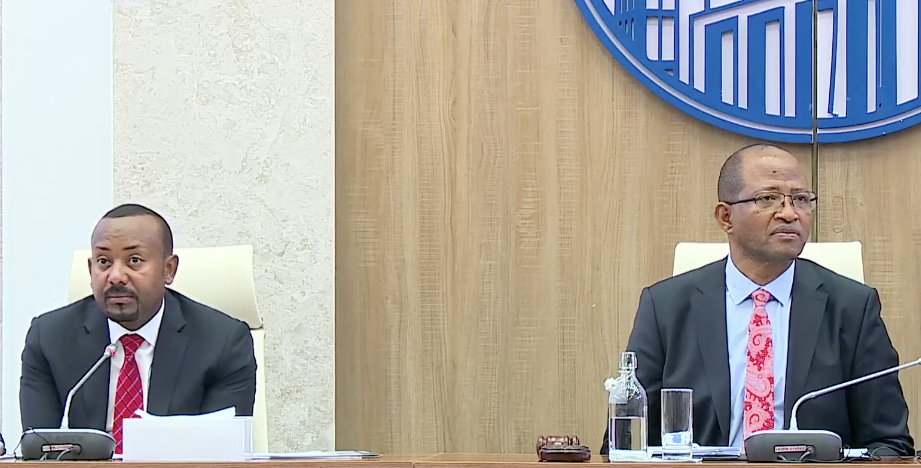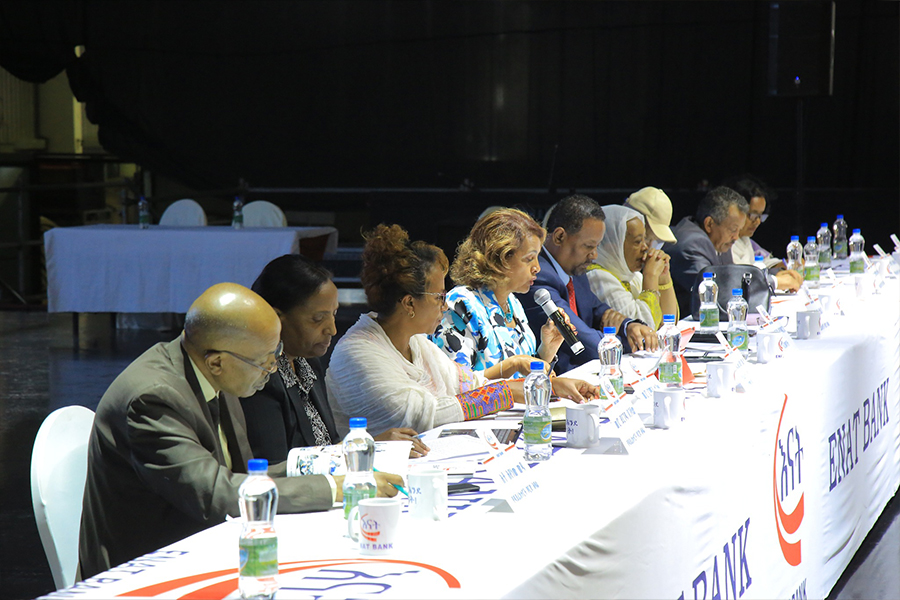
My Opinion | Aug 13,2022
Nov 14 , 2023

Ethiopia's lawmakers directed questions to Prime Minister Abiy Ahmed (PhD) today at the Parliament’s session, which followed President Saheleworq Zewdie’s motion to the joint meetings of both legislative houses a month ago.
The session addressed a spectrum of pressing national issues, encompassing the escalating cost of living, a severe foreign exchange shortage, deteriorating public services in health and education, and the stagnant progress of the national dialogue. The ongoing security challenges and the PM’s administration’s handling of these critical areas reflected growing concerns among legislators.
Abiy has expressed concerns that perceptions and analyses of crucial national issues, including his government's quest for maritime access and the construction of the Grand Ethiopian Renaissance Dam (GERD) project, are being clouded by emotional responses and conspiracy theories.
He told MPs that “emotions and conspiracies” obstruct a shared understanding of the country's and its people's challenges. He blamed “singular, distorted and deconstructive narratives” prevalent in the country and polarisation in views as impending progress in resolving the multiple conflicts and building a state.
As Ethiopia navigates through the post-war and pandemic era, the PM hailed the economy's recovery, endorsing a double GDP growth.
He told MPs that homegrown economic reforms, particularly in the manufacturing sector, impacted the economy with an import substitution strategy showing an eight per cent increase in textile, leather and chemical production.
Economists question whether GDP growth always reflects a country's welfare. The disparity between GDP growth and actual quality of life, particularly in a climate marked by great socioeconomic inequality, allows economic data to be used as optics rather than reality.
An MP has spotlighted a distorted trade and export regime severely impacting the coffee sector in the country's southern region. He criticised the regulatory framework for its insufficient oversight, arguing that this negligence marginalises coffee farmers and disadvantages legitimate coffee exporters.
Export earnings from coffee have plummeted by approximately 32pc year-on-year. This downturn is attributed to a confluence of factors, including market volatility and a widening gap between domestic and international market prices. The fiscal year 2023 saw coffee exports generate a mere 854 million dollars, starkly contrasting to the preceding year's 1.4 billion dollars.
Exporters, facing significant losses, exhibited a growing reluctance to engage with the international market, fearing further financial setbacks. This has exacerbated existing trends posed by the disparity in pricing, creating a complex economic crisis for the sector. The MP's urged Prime Minister Abiy for a more robust and equitable regulatory enforcement to support the coffee industry.
In the wake of augmenting the financial industry plagued by limited accessibility and credit supply, the importance of boosting the regulatory and supervisory capacity of the National Bank of Ethiopia is indicated as crucial by PM Abiy Ahmed.
At the same time, he responded to the growing unease over the state of Ethiopia’s education system.
Prime Minister Abiy has ardently defended his administration’s policy as a meticulously structured, seven-segment reform. This comes against the backdrop of disappointing high school exam results, exacerbated by the impacts of regional conflicts that led to the closure of numerous educational facilities in several regional states.
Addressing members of Parliament, the Prime Minister stressed the necessity of these reforms, warning that without a comprehensive overhaul, the education system faces an imminent threat of collapse.
Diversifying TVET institutions is indicated by the PM as an antidote to the deteriorating education system in the country that had over 97pc of high school students fail to join higher education. However, officials from the Ministry of Labor & Skills observed that the long-term courses have discouraged students from joining these institutions.

My Opinion | Aug 13,2022

Fineline | Jan 19,2019

Fortune News | Feb 10,2024

Commentaries | Jun 07,2025

Delicate Number | Mar 16,2024

Editorial | Jun 01,2019

Fortune News | Dec 25,2022

News Analysis | Mar 02,2024

Radar | Aug 20,2024

In-Picture | Jul 21,2024

Photo Gallery | 156585 Views | May 06,2019

Photo Gallery | 146872 Views | Apr 26,2019

Photo Gallery | 135413 Views | Oct 06,2021

My Opinion | 135257 Views | Aug 14,2021

Sep 13 , 2025
At its launch in Nairobi two years ago, the Africa Climate Summit was billed as the f...

Sep 6 , 2025
The dawn of a new year is more than a simple turning of the calendar. It is a moment...

Aug 30 , 2025
For Germans, Otto von Bismarck is first remembered as the architect of a unified nati...

Aug 23 , 2025
Banks have a new obsession. After decades chasing deposits and, more recently, digita...